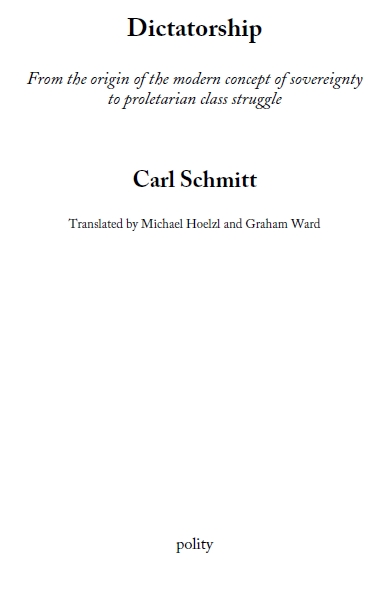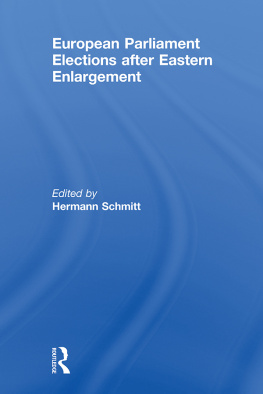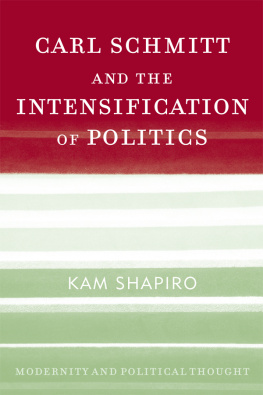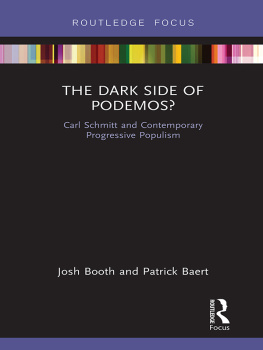Schmitt - Dictatorship
Here you can read online Schmitt - Dictatorship full text of the book (entire story) in english for free. Download pdf and epub, get meaning, cover and reviews about this ebook. year: 2014, publisher: Wiley, genre: Politics. Description of the work, (preface) as well as reviews are available. Best literature library LitArk.com created for fans of good reading and offers a wide selection of genres:
Romance novel
Science fiction
Adventure
Detective
Science
History
Home and family
Prose
Art
Politics
Computer
Non-fiction
Religion
Business
Children
Humor
Choose a favorite category and find really read worthwhile books. Enjoy immersion in the world of imagination, feel the emotions of the characters or learn something new for yourself, make an fascinating discovery.
Dictatorship: summary, description and annotation
We offer to read an annotation, description, summary or preface (depends on what the author of the book "Dictatorship" wrote himself). If you haven't found the necessary information about the book — write in the comments, we will try to find it.
Dictatorship — read online for free the complete book (whole text) full work
Below is the text of the book, divided by pages. System saving the place of the last page read, allows you to conveniently read the book "Dictatorship" online for free, without having to search again every time where you left off. Put a bookmark, and you can go to the page where you finished reading at any time.
Font size:
Interval:
Bookmark:


First published in German as Dictatorship: From the Beginning of the Modern Concept of Sovereignty to the Proletarian Class-Struggle Duncker & Humblot: Berlin, 7th edition 2006.
This English edition Polity Press, 2014

The translation of this work was supported by a grant from the Goethe-Institut which is funded by the German Ministry of Foreign Affairs.
Polity Press
65 Bridge Street
Cambridge CB2 1UR, UK
Polity Press
350 Main Street
Malden, MA 02148, USA
All rights reserved. Except for the quotation of short passages for the purpose of criticism and review, no part of this publication may be reproduced, stored in a retrieval system, or transmitted, in any form or by any means, electronic, mechanical, photocopying, recording or otherwise, without the prior permission of the publisher.
ISBN-13: 978-0-7456-4647-3
ISBN-13: 978-0-7456-4648-0(pb)
A catalogue record for this book is available from the British Library.
The publisher has used its best endeavours to ensure that the URLs for external websites referred to in this book are correct and active at the time of going to press. However, the publisher has no responsibility for the websites and can make no guarantee that a site will remain live or that the content is or will remain appropriate.
Every effort has been made to trace all copyright holders, but if any have been inadvertently overlooked the publisher will be pleased to include any necessary credits in any subsequent reprint or edition.
For further information on Polity, visit our website: www.politybooks.com
Love dictates
For
Thilda and Iriyana
Its 1919. The Great War is over, Europe is exhausted and monarchy in tatters. Wilhelmine Germany, the epitome of the authoritarian state, lies in ruins. The Weimar Republic, declared on 9 November 1918, is assessing just how great the challenge that it faces is; how volatile the predicament. The young Carl Schmitt (born in 1888), author already of four books and six articles (two of which will be important precursors to Die Diktatur), is in Munich. With brief excursions to Strasbourg, he has been in Munich since March 1915, when he joined the general staff of those who were in charge of implementing the Bavarian state of law of 1912 and administering martial law. is at the centre of the army and Reichswehr resistance; and, although the revolt is quashed, it is not until the beginning of July 1919 that Schmitt is released from his official duties. Even then, he remains in Munich, finding work eventually as a lecturer in the School of Business Administration, after he successfully finished his postdoctoral thesis (Habilitationsschrift) in 1916: Der Wert des Staates und die Bedeutung des Einzelnen. On 11 August the Weimar Constitution comes into effect. This is the immediate background against which Schmitt starts his groundbreaking Dictatorship.
To some extent, even during the war, Schmitt had found time to reflect upon what was happening around him and upon the work his own office was concerned with. This gave rise, in his mind, to an important distinction between law (Gesetz) and the necessary measures (Manahmen) that had to be taken in times of crisis. In 1916 he published a long essay entitled Dikatur und Belagerungszustand: Eine staatsrechtliche Studie, Both essays dealt with the legality of the state of siege in Germany a topic at the forefront of the final chapter of his book, which was based on the Prussian law of 1851. Both essays discussed the suspension of constitutional law in a time of danger to the security, stability and unity of the nation. The state of exception, if not a political reality, always remained a political possibility in Schmitts conception of constitutional law. Both essays endorsed a strong notion of the state, distinct from a liberal emphasis upon the individual; and both advocated the need for a strong commander: a commissary dictatorship or a power delegated by a constituted sovereignty. This dictatorship must institute temporary measures that are unconstitutional during normal life and would not lead to its reestablishment. To understand why these essays appeared when they did is to understand how dictatorship was an issue in Germany even before the end of the First World War and hence to understand why the issue could come to prominence once again with the Weimar Republic.
Under Kaiser Wilhelm II, to all intents and purposes, Germany was governed by an absolute monarch, but the monarchy had increasingly withdrawn from political life, making Wilhelms position a matter of decoration. The power lay in the hands of the military. Hence, at the end of 1916, the army had appointed the generals Hindenburg and Ludendorff to offices of supreme command. Although the Kaiser did not formally abdicate until 9 November 1918, his acceptance of the two appointments was in effect an abdication. Hindenburg and Ludendorff were in charge of the war effort, of foreign and domestic policy, and even of the appointment and dismissal of the chancellor. As Helmut Heiber (1993: 3) puts it: In this way constitutional monarchy, against which the demand for parliamentary reform was bound to be directed, had turned into a military dictatorship that was virtually unassailable at least in wartime. Schmitt, then, as a fledgling constitutional lawyer and a member of the armed forces, was already aware of contemporary forms of commissary dictatorship. Ludendorff, considered the real political intelligence behind the military command, did not step down from office until 26 October 1918, resigning as if he were just another general and not the virtual dictator of the Reich (Heiber 1993: 6; see also Ludendorff 1919). It was only with this resignation that the army capitulated to the Reichstag (making the pursuit of an armistice more possible), so that a parliamentary government could be announced on 28 October, through an amendment to the existing constitution. Dictatorship was not, then, a new idea or practice.
At this point Schmitt was technically still employed by the army; but Munich was the scene of immense chaos. Ludwig III, the king of Bavaria, abdicated even before the Kaiser, on 7 November; and three different governments were wrestling for control. Kurt Eisner, an independent socialist, declared a Bavarian republic and parliament, winning over the majority of the socialists people who would have been called members of Soviets, that is, the bolshevick units of government. Schmitt was certainly part of one the soldiers council; but he would certainly have opposed the other two a Bavarian workers council and a Bavarian peasants council. In the chaos, the administration was still in the hands of the military, now under the auspices of the soldiers council. Three modes of government were at loggerheads: the social democracy under Eisner; the old regime of the army, which was strongly anti-democratic and on the whole indifferent to parliament; and a faction seeking a German republic based on the power of the proletariat rather than any parliamentary democracy. Bavaria quickly became not the exception but the rule, particularly because, after the amendment to the constitution made in the Reichstag and the very announcement of a parliamentary government, the session of the Reichstag was adjourned, leaving a power vacuum in its wake. How much of this chaos Schmitt saw is conjectural, but from 1917 on and throughout this whole period he was feverishly doing research for a book on political romanticism (
Next pageFont size:
Interval:
Bookmark:
Similar books «Dictatorship»
Look at similar books to Dictatorship. We have selected literature similar in name and meaning in the hope of providing readers with more options to find new, interesting, not yet read works.
Discussion, reviews of the book Dictatorship and just readers' own opinions. Leave your comments, write what you think about the work, its meaning or the main characters. Specify what exactly you liked and what you didn't like, and why you think so.














